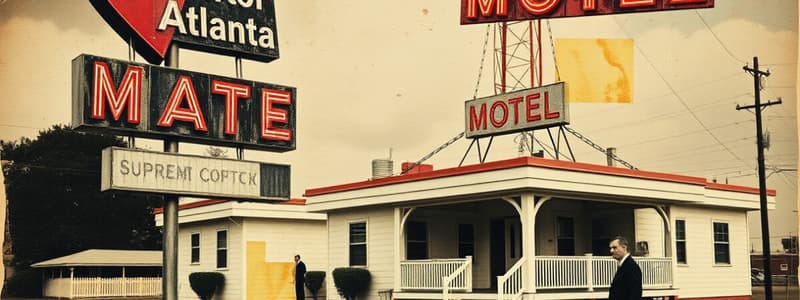Podcast
Questions and Answers
What was the main issue with the Heart of Atlanta Motel?
What was the main issue with the Heart of Atlanta Motel?
- It was well advertised and frequently denied African Americans rooms. (correct)
- It provided free rooms for everyone.
- It only accepted white customers.
- It was known for excellent service.
What was the argument of the Heart of Atlanta Motel?
What was the argument of the Heart of Atlanta Motel?
Congress exceeded its power to regulate commerce and it violated the 5th and 13th Amendments.
What did the U.S. argue regarding the commerce clause?
What did the U.S. argue regarding the commerce clause?
Under the commerce clause, congress can remove obstructions to public accommodations for African Americans.
What was the court's decision regarding the Heart of Atlanta Motel case?
What was the court's decision regarding the Heart of Atlanta Motel case?
Did Congress exceed its Commerce Clause power by depriving motels the right to choose their own customers?
Did Congress exceed its Commerce Clause power by depriving motels the right to choose their own customers?
What is the Civil Rights Act of 1964?
What is the Civil Rights Act of 1964?
What did the lower court decide regarding the U.S. actions?
What did the lower court decide regarding the U.S. actions?
What did the Heart of Atlanta Motel want to do?
What did the Heart of Atlanta Motel want to do?
Flashcards are hidden until you start studying
Study Notes
Case Overview
- Heart of Atlanta Motel often denied African Americans accommodations, violating the 1964 Civil Rights Act that prohibits discrimination in public facilities.
- The case spotlighted significant civil rights issues in the context of interstate commerce.
Heart of Atlanta Motel Arguments
- Argued that Congress exceeded its regulatory power over commerce, claiming infringement of the 5th and 13th Amendments.
- Contended that the government's intervention in customer selection violated their rights as a business.
U.S. Government Arguments
- The government asserted that under the Commerce Clause, Congress can dismantle barriers to public accommodations for African Americans.
- Claimed that racial segregation in public facilities interfered with interstate commerce.
Court Decision
- The Supreme Court ruled in favor of the U.S., declaring that "segregation by race of private facilities engaged in interstate commerce is unconstitutional."
- Set a precedent affirming federal authority to regulate discrimination in public accommodations.
Legal Implications
- Central issue: Did Congress overstep its power under the Commerce Clause by regulating the Heart of Atlanta Motel's customer choices?
- The case clarified the extent of federal power in civil rights enforcement.
Civil Rights Act of 1964
- A landmark piece of legislation that outlaws discrimination based on race, color, religion, sex, or national origin in the United States.
- Key legislation empowering federal action against discriminatory practices in public accommodations.
Lower Court Ruling
- The lower court upheld the actions of the U.S., reinforcing the constitutionality of the Civil Rights Act in this context.
- Affirmed Congress’s authority to legislate against racial discrimination in public facilities.
Motel's Intent
- The Heart of Atlanta Motel aimed to exclude African Americans from its services.
- This intent fueled the legal battle over civil rights and business autonomy.
Studying That Suits You
Use AI to generate personalized quizzes and flashcards to suit your learning preferences.




